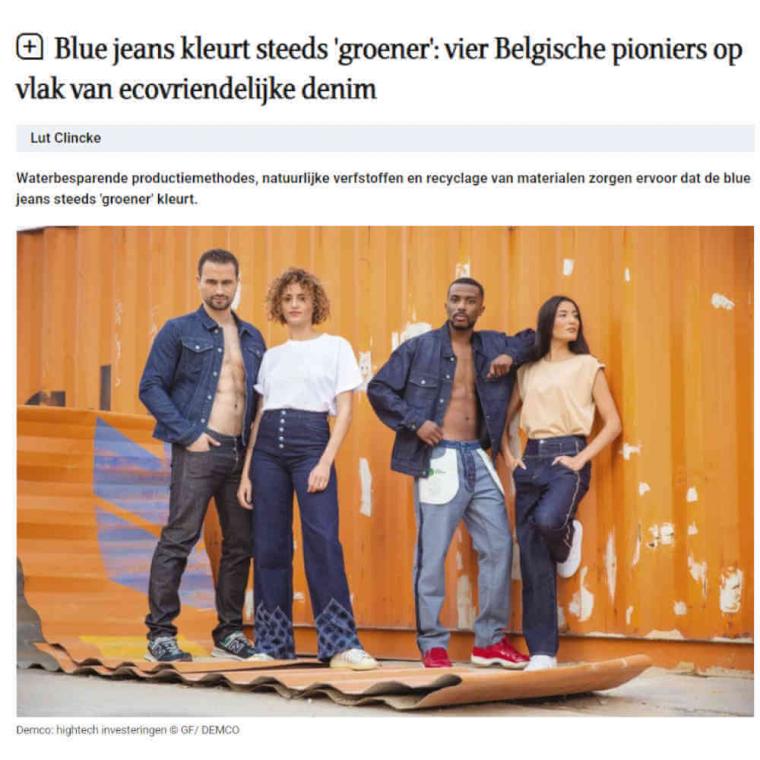Knack Weekend

source Knack Weekend 02/06/2021
https://weekend.knack.be/lifestyle/mode/nieuws-trends/blue-jeans-kleurt-...
Blue jeans are becoming increasingly 'greener': four Belgian pioneers in the field of eco-friendly denim
1. Demco: high-tech investments
Demco was founded 30 years ago by Johnny De Meirsman and his wife Sihem Bouguila. The denim company works for Tommy Hilfiger and Lee Cooper, among others, has eco-friendly production methods, is certified for its environmental care system and has the GRS certificate (Global Recycled Standard). 'Our customers attach more and more importance to this,' says Patrick Raes, commercial director. 'A brand has to be sustainable today. As a manufacturer, we continue to invest in new technologies. The fact that jeans were so polluting until recently has to do with water consumption. Thanks to the combination of water purification and water-saving technologies, we have reduced the water consumption per jeans from 100 liters to 7 liters. For the painting process, we have developed a drydye technology in which a mineral dye is injected. For the stonewashing we use ecostones, reusable, wear-resistant stones that do not pollute the water. All waste is recycled and we have an upcycling project. We are a CO2 neutral zero waste company.'
2. Godfrieds jeans: raw denim at its purest
Godfried Vanden Daele has years of experience in various jeans companies and started his own artisanal and sustainable label a few years ago: Godfrieds jeans. 'All jeans are made of raw denim, as it used to be. Raw denim is a hard, unwashed jean that conforms to the body and lasts a long time. The less you wash it, the better it will wear over the years and the smaller your ecological footprint becomes.
'I only work to order in order to avoid overstock. In addition to standard sizes, custom orders can also be made. I only use high-quality self-edge denim from Japan and Italy that is still woven in the traditional way. Everything is made of natural materials and therefore 100% recyclable. I use linen yarn for stitching and the buttons are made of corozo, a vegetable material. The jeans are made in our own workshop in West Flanders. This keeps the ecological footprint very limited.'
Prices from 120 euros. godfrieds.com.
3. HNST: Circular Jeans
HNST - honest - is the label of Lander Desmedt and Eva Engelen. 'We design our jeans in such a way that the garments can be recycled,' says Eva Engelen. 'It starts with the development of our own yarns. An HNST jeans contains 56% recycled cotton, which comes from old jeans. One part consists of virgin cotton and one part of Tencel, an organic material derived from eucalyptus trees. The impact on the environment is reduced as much as possible at every step in production.
'We work together with a partner in Germany for recycling, the yarns are spun in Belgium and the fabric is woven in Italy. We use advanced, clean technologies. For example, we use pectin from orange peels as an alternative to the standard plastic coating used to treat yarns. This way we prevent microplastics from ending up in the environment. Thanks to our circular way of working, we emit 76% less CO2 and use twenty times less water than in traditional jeans production.'
Price: 135 euros, of which 15 euros deposit. You can exchange worn jeans for a new one with a 15 euro discount. letsbehonest.eu
4. Tropas: from jeans to shoes
Caro Peirs, the woman behind the sustainable shoe brand Tropas, proves that you can go in any direction with discarded jeans. She uses worn-out jeans for the uppers of her shoes. The jeans are cut in a social workshop in Belgium, the shoes are manufactured in Spain, without polluting glue. All parts of the shoe are easy to disassemble at the end of their life and are fully recyclable. When the shoes are worn out, they can be returned to the Tropas sales outlets.
All parts of the worn Tropas shoes are given a new life: the textile is processed into insulation material, the wooden heels are reworked into table tops by a local workshop and the soles are finely ground and reworked into sneaker soles together with new material. 'Actually, it's not about the shoes in themselves, they are a means of demonstrating that entrepreneurship can be social, sustainable and circular. We have to take care of ourselves, each other and the planet', says Caro Peirs.
tropas.shoes
WHY ARE JEANS SO DIRTY?
It takes eight thousand liters to make a pair of jeans. 'Jeans use a lot of water because the main component is cotton', says Joris Cools, researcher at the department of fashion technology at HoGent. 'After the crop has been picked, it must be washed, spun, woven and processed. A process that requires a lot of moisture.' In addition, drinking water
